DE
EN

Vaillant Group
Sustainability progress report 2021 / 2022
About this report
This report offers an overview of the progress made by the Vaillant Group with regard to sustainability in 2021. It covers all the essentials in terms of our management approach and defined focus areas, which form the basis of our sustainability activities, as well as the sustainability targets for 2030 derived therefrom and the extent to which they have been met. Furthermore, the report presents additional key figures that act as control variables in the field of sustainability.
Further information on our sustainability activities and in particular the relaunch of our SEEDS sustainability programme can be found in the section Our responsibility.
SEEDS – the Vaillant Group’s sustainability programme
In order to secure the long-term economic success of the company, the Vaillant Group focuses on ecological and social aspects as well as economic ones. Our customers have clear-cut expectations regarding the energy and resource efficiency of our devices. For us, however, sustainability means more than selling particularly energy-saving products. It means that the strategic and operational decisions taken by a company must consider factors related to sustainability. We therefore always have to ask ourselves what direct and indirect effects a business decision and the company’s actions will have on people and the environment.
Sustainable in four focus areas
The Vaillant Group consolidates its sustainability activities in the strategic programme SEEDS. The name of the programme stands for Sustainability in Environment, Employees, Development & Solutions and Society. Binding, quantifiable targets have been set in the following focus areas: Environment, Employees, Development & Solutions and Society. We develop specific measures based on these targets and continuously monitor the results. SEEDS forms the ethical foundation of the Vaillant Group. The programme is based on a holistic understanding of sustainability and supports the Vaillant Group’s corporate vision “Taking care of a better climate. Inside each home and the world around it”. All activities in the area of sustainability are related to the company’s core business and thus contribute to the long-term success of the company.
Focus areas
Our sustainability strategy comprises four focus areas. We have defined and continuously pursue long-term targets in each of these areas.

Vaillant Group
The Sustainability Management department is assigned to the Corporate Communications, Sustainability Management & Politics division. It reports directly to the CEO of the Vaillant Group. The team sets sustainability targets in close consultation with the Management Board, the individual departments and the company’s business units, systematically monitors their progress and provides impetus for improving company-wide sustainability performance. In addition, the Group-wide environmental management system, which is compliant with the DIN EN ISO 14001 standard, is also controlled centrally from here.
Organisational structure
The Vaillant Group has a Group-wide sustainability management function which is firmly anchored in its corporate structure.

Vaillant Group
SEEDS management system
Management Approach
We manage our sustainability performance using an established standard: the classic control circle applied to corporate management systems. On the basis of the sustainability strategy, binding and verifiable targets are set for all four focus areas in the SEEDS programme. In the Environment field, for example, where the company’s own CO2 emissions (Scopes 1 and 2) are to be reduced by 50 per cent by 2030. To meet these targets, operational measures are defined and implemented together with the relevant divisions. In order to test how effective these measures are, key performance indicators (KPIs) and a target figure are established for all targets. We regularly survey all relevant data on a Group-wide basis to calculate the individual KPIs. These are brought together in a central control tool, the Vaillant Group Sustainability Scorecard. The scorecard is updated quarterly and communicated internally. When interpreting the figures, we take into account specific factors such as changes to production capacities and current production volumes. By comparing figures from the same period in the previous year against the long-term targets during the annual review, we are able to gain an accurate picture of the current state of our sustainability performance.
Materiality Analysis
There are few business-related topics that affect more areas than sustainability does. In order to successfully implement comprehensive sustainability management, a clear strategy, the success of which is measured against binding targets, is required, as is clarity in relation to the fields of action that are particularly important – both from the company’s perspective and that of its stakeholders. As part of a materiality analysis, we carried out, most recently in 2019, a systematic survey of customers, partners, suppliers, employees, owners and other relevant stakeholders and thus defined the sustainability-related topics that are most important for our business activities. These topics are aggregated into fields of focus in the Vaillant Group Materiality Matrix. Climate- and environmentally friendly products and services, resource conservation and the ability to meet our customers’ ever-growing demands on comfort lie at the heart of our activities. In addition to climate protection and the associated international target of limiting global warming to a maximum of 1.5 degrees Celsius, topics such as the promotion of sustainability in the supply chain and the protection of human rights are high on the list of priorities.
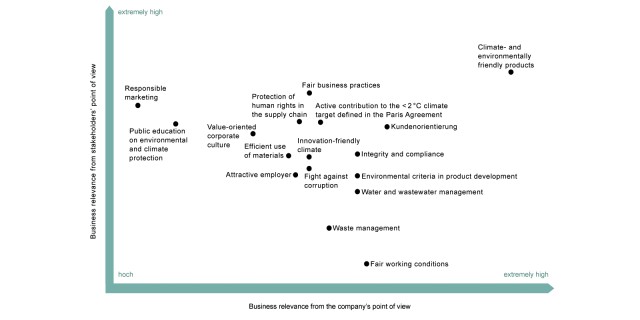
Vaillant Group
Systems and processes
Uniform, company-wide processes are necessary to improve the sustainability balance in an international company. This is because Group-wide processes are needed to lay down standards that ensure sustainability aspects are taken into account throughout the value chain. The topic of sustainability is firmly anchored in the product development processes, from product strategy to market launch. To manage company performance in terms of environmental protection, occupational health and quality, the Vaillant Group uses differentiated management systems that are based on internationally valid standards. The Vaillant Group regularly has the implementation of these systems audited by independent institutes as part of certification processes. All of our production and development sites have been certified as compliant with quality standard DIN EN ISO 9001, environmental standard DIN EN ISO 14001 and international health and safety standard DIN EN ISO 45001.
SEEDS control circle
We manage our sustainability performance using an established approach: the classic control circle applied to corporate management systems.
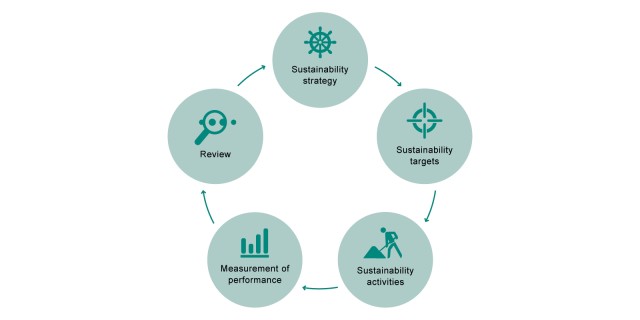
Vaillant Group
SEEDS sustainability targets
Since the introduction of the Group-wide SEEDS sustainability programme, the Vaillant Group has achieved many of the targets it has set itself. In the period from 2010 to 2018, absolute energy consumption fell by around 14 per cent despite sales growth and significantly higher production volumes. CO2 emissions were reduced by 16 per cent. In relation to production minutes, energy consumption and CO2 emissions were reduced by around 30 per cent.
With the relaunch of SEEDS, the Vaillant Group has set new sustainability targets for 2030 in its four focus areas. The base year of the new targets is 2018. The presentation of the following key figures in this progress report has been adjusted accordingly.
A comprehensive climate strategy forms the basis for future environmental targets. The calculation and accounting of our greenhouse gas emissions is based on the Greenhouse Gas Protocol, an internationally recognised standard.
In concrete terms, the Vaillant Group will gradually halve CO2 emissions for which it is responsible from around 60,000 tonnes per year in 2018 to around 30,000 tonnes by 2030. In the Greenhouse Gas Protocol, these emissions fall within Scope 1 and Scope 2. This will be achieved through the consistent use of electricity from renewable energy sources, efficiency measures in buildings and production and switching to an electric vehicle fleet. In accordance with the Greenhouse Gas Protocol, the Vaillant Group factors in all other relevant greenhouse gases under the Kyoto Protocol alongside CO2. Emissions of these gases are converted into so-called CO2 equivalents and included in the calculation of the Vaillant Group’s carbon footprint.
Compared to the base year 2018, the company had reduced its CO2 emissions by 25 per cent by the end of 2021. The remaining approximately 45,000 tonnes of CO2 from 2021 were offset by certificates from a Gold Standard-certified afforestation project in Panama. This means that the Vaillant Group has been climate-neutral within its own area of business responsibility (Scopes 1 and 2) since 2020.
All key sustainability indicators from 2010 onwards are included in the Sustainability Progress Report 2019 | 2020, which is available on the company’s website.
Sustainability figures 2021/2022
Environment
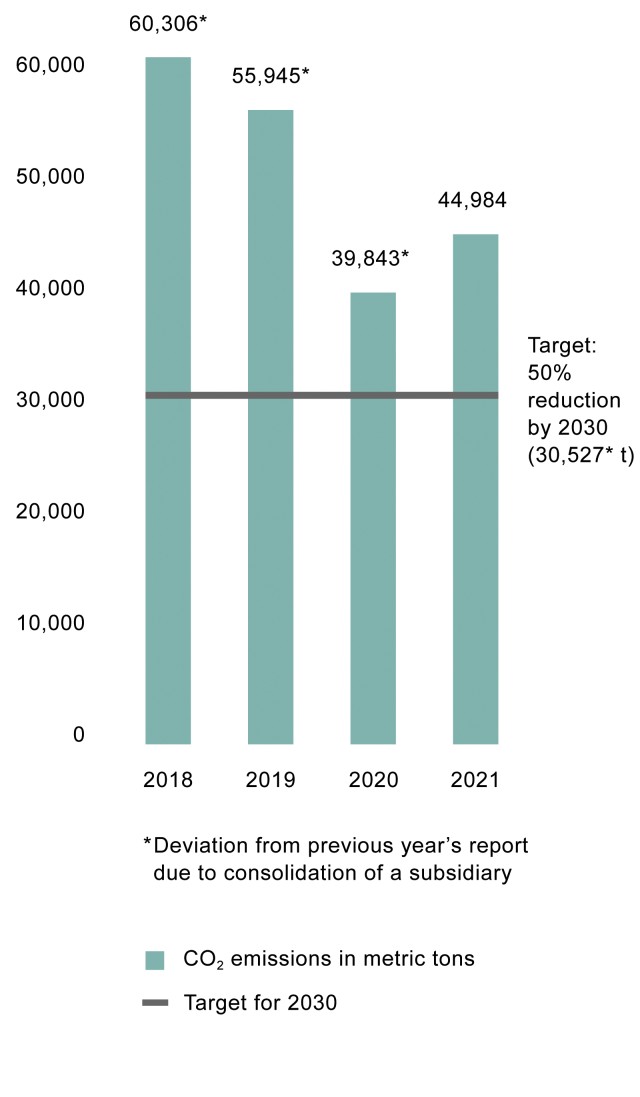
Vaillant Group
Greenhouse gas emissions for which we are directly responsible (Scopes 1 and 2)
As the basis for its climate strategy, the Vaillant Group has been recording its greenhouse gas emissions in accordance with the internationally recognised Greenhouse Gas Protocol standard since 2018. Since 2020, only electricity from renewable energy sources has been used. The biggest remaining areas of leverage are the vehicle fleet and emissions from gas consumption in production and for heating buildings. Following significantly lower vehicle mileage and emissions during the Covid-19 pandemic in 2020, there was a renewed increase in 2021. However, emissions remain below those of 2019. At the Vaillant Group’s production sites, more natural gas was needed in 2021 due to increasing volumes, which also led to an increase in greenhouse gas emissions.
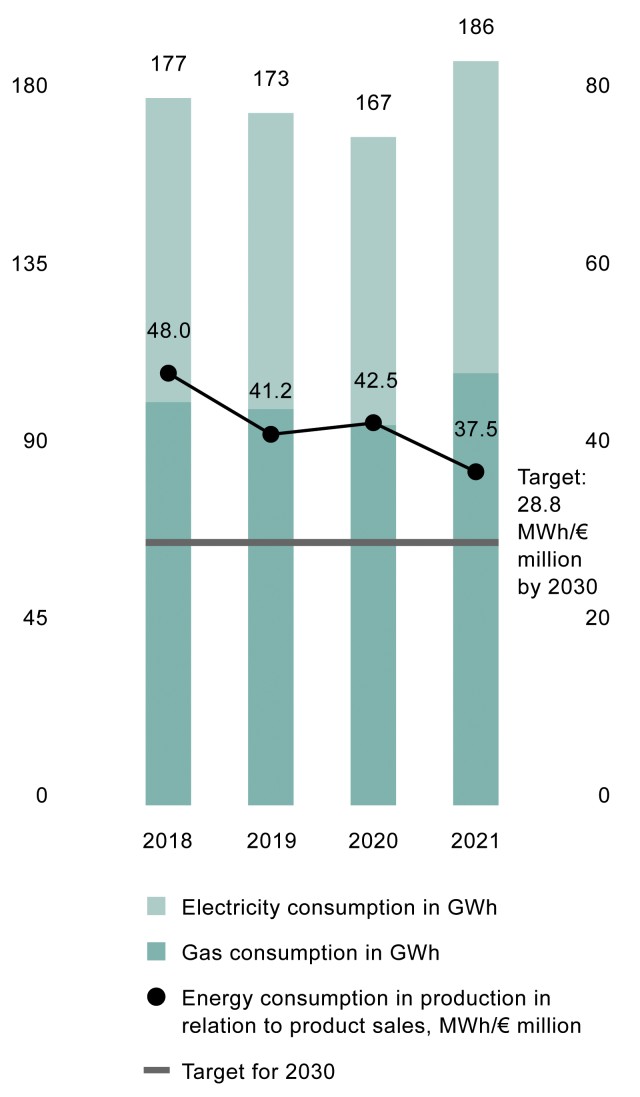
Vaillant Group
Energy consumption
The total energy consumption includes the electricity and gas consumption of the production sites. Since 2018, the consumption of the sales companies has also been calculated. Gas and electricity consumption increased compared to the previous year due to higher production volumes. Energy consumption in relation to product sales, on the other hand, has fallen and is below the linear target achievement path for 2030.
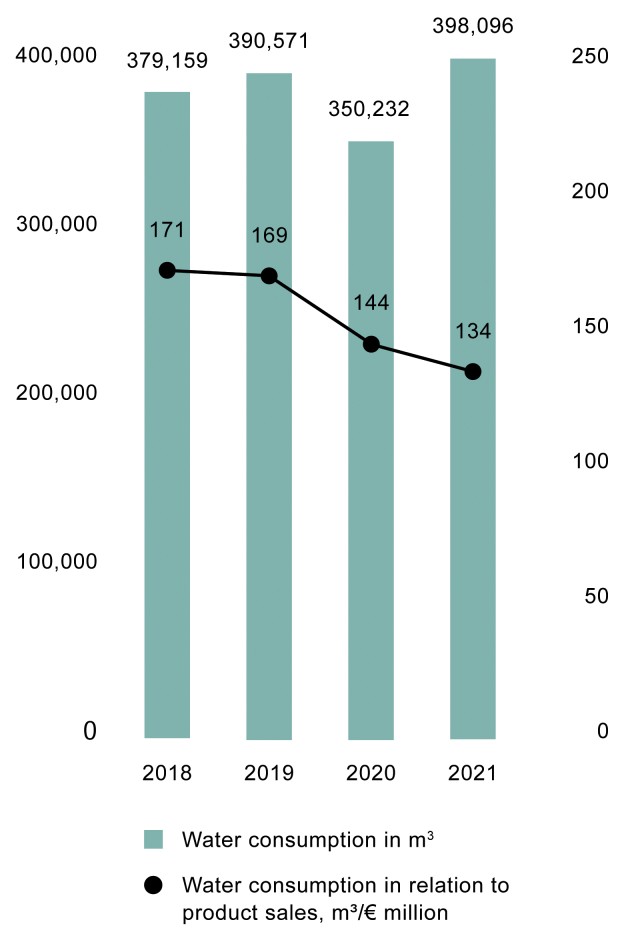
Vaillant Group
Water consumption
The Vaillant Group records water consumption at all production and development sites. Water consumption has risen again compared to the previous year. On the one hand, this is due to the fact that the Johann Vaillant Technology Center became fully operational in 2021 and, on the other hand, to the increased production figures. In relation to product sales, the figure has decreased.
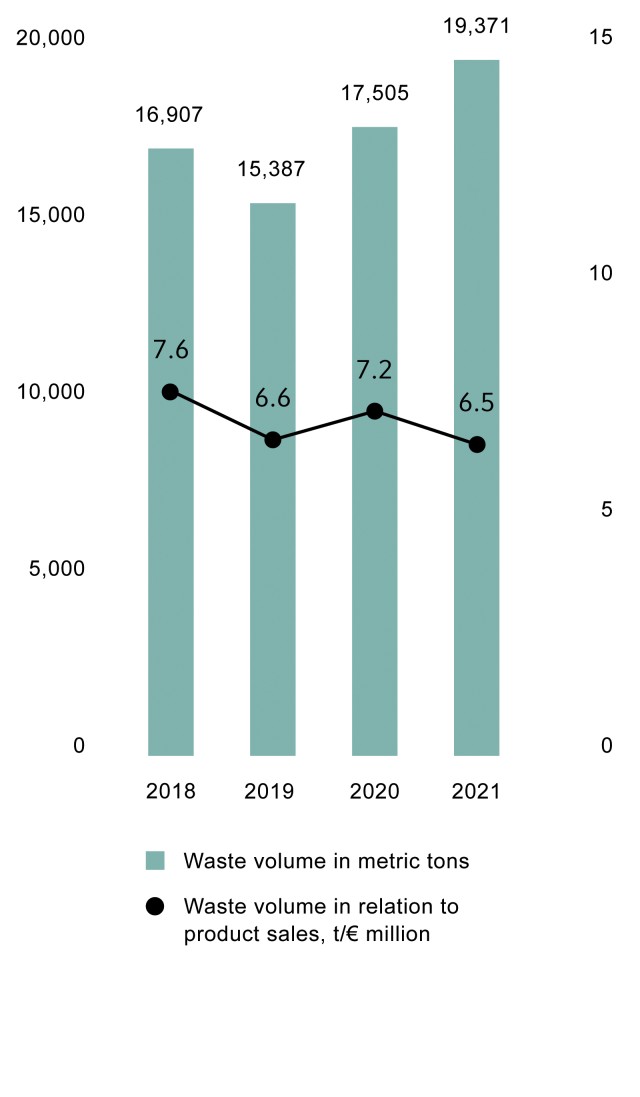
Vaillant Group
Waste volume
The Vaillant Group records the waste volume across all manufacturing and development sites. Scrap metal makes up for around 55 per cent of our waste. The rest is largely attributed to packaging waste. In 2021, the total amount of waste grew due to higher production volumes. A disproportionate increase in packaging waste (cardboard and wood) was recorded in the significantly expanded area of heat pump production.
Employees
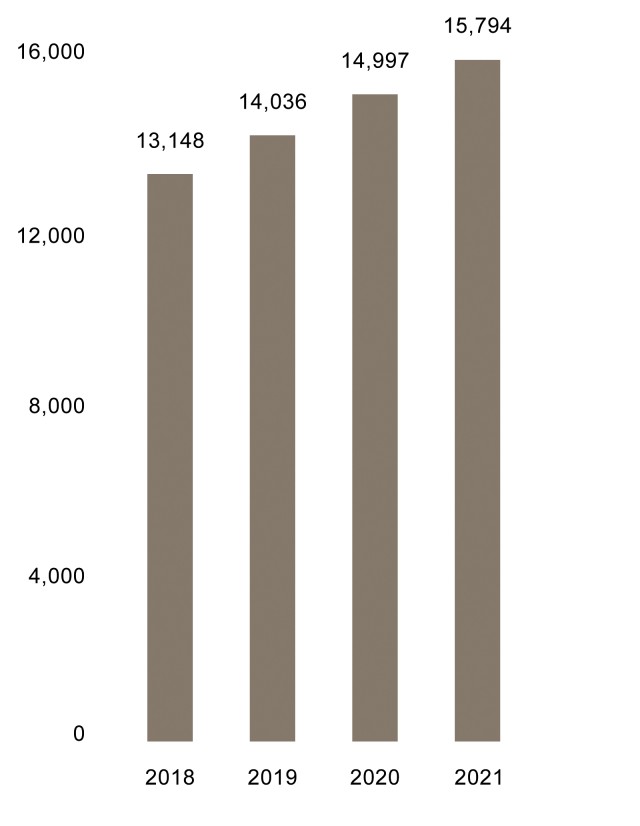
Vaillant Group
Number of employees
The Vaillant Group's headcount is constantly growing by more than 5 per cent a year. In 2021, 15,794 people were employed in the company.
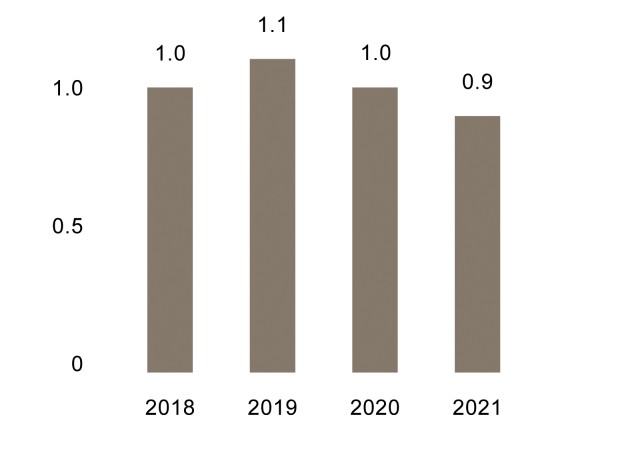
Vaillant Group
Accidents at work
The indicator for accidents at work is known as the total injury rate (TIR, accidents per 200,000 hours worked). The number of accidents at the company has been on the decline for years. Our occupational health and safety management system is certified in accordance with DIN EN ISO 45001. All employees are actively incorporated in occupational health measures.
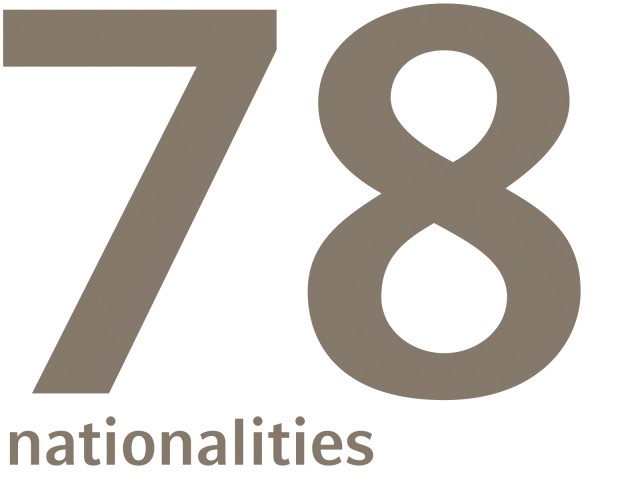
Vaillant Group
78 nationalities
The Vaillant Group is an internationally oriented company that has sales companies in more than 20 countries and is active in over 60. This is also reflected in the cultural diversity of our workforce. People with a total of 78 nationalities work for the Vaillant Group.
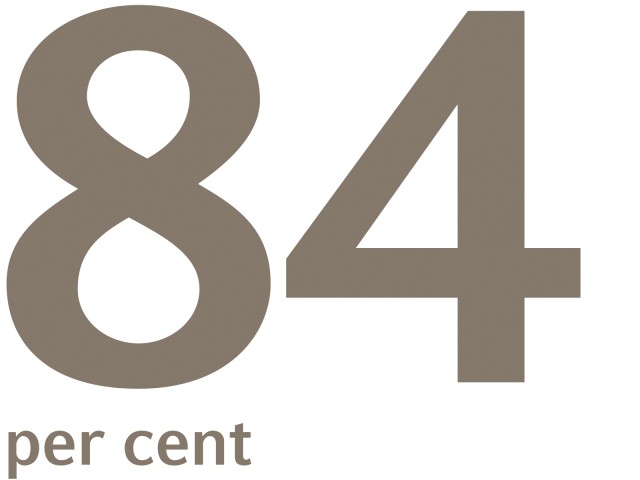
Vaillant Group
Recommendation rate
The “SENSOR” employee survey in 2021 showed that 84 per cent of employees would recommend the Vaillant Group as an employer. In the last survey in 2018, the figure was 80 per cent. The target is to increase the recommendation rate to at least 85 per cent.
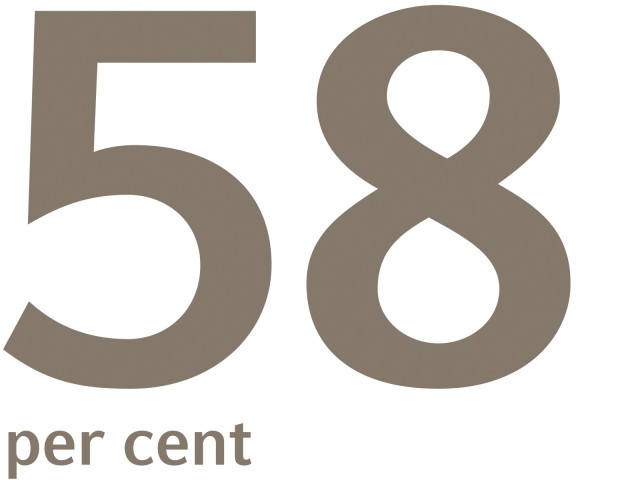
Vaillant Group
Internal filling of management vacancies
Our aim is to fill about two-thirds of management positions from within our own ranks. In 2021, it was possible to fill 58 per cent of these positions internally.
Development & solutions
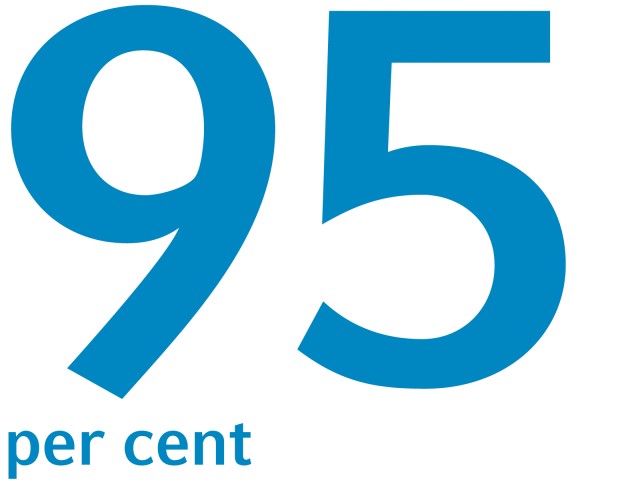
Vaillant Group
Efficient use of raw materials
It is important to the Vaillant Group to use materials efficiently. The proportion of offcuts and scrap metal in our production has been further reduced. At 95 per cent, the efficiency rate for the raw material used is at a very high level.
Society
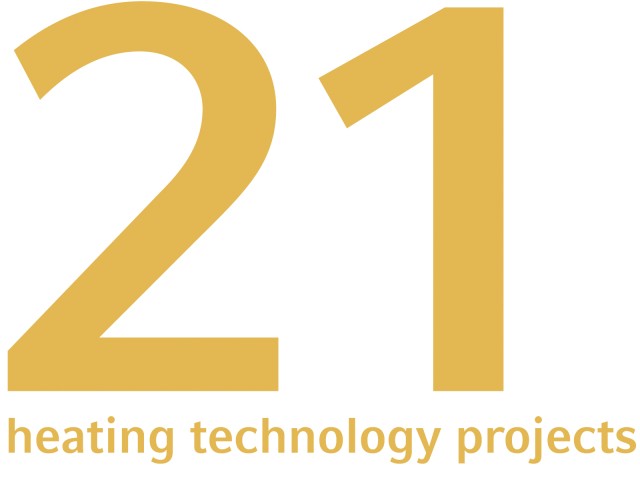
Vaillant Group
Support for SOS Children’s Villages
As part of the international partnership with the charitable organisation SOS Children’s Villages, a total of 21 heating technology projects were carried out in 2021. The Vaillant Group also supported SOS Children’s Villages with 11 social projects, including charity runs in France and the Spare Cents fundraising campaign in Germany.
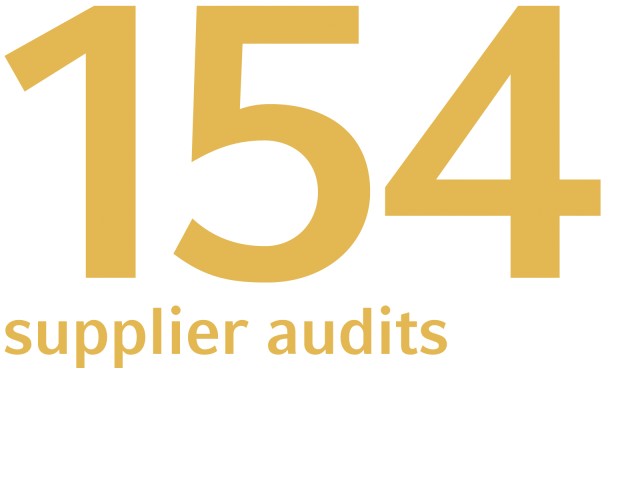
Vaillant Group
Social checks in supplier audits
We randomly check compliance with our sustainability requirements for suppliers and service providers in “social checks” as part of supplier audits. This takes place on the basis of a standardised questionnaire on the topics of human rights and labour standards, occupational safety, environmental protection, anti-corruption and grievance mechanisms. A total of 154 supplier audits were carried out in 2021. In 62 per cent of these audits, a social check was also carried out. Due to the Covid-19 pandemic, audits have been taking place virtually in many countries since 2020. Our aim is to carry out a social check as part of 100 per cent of regular supplier audits in the future.
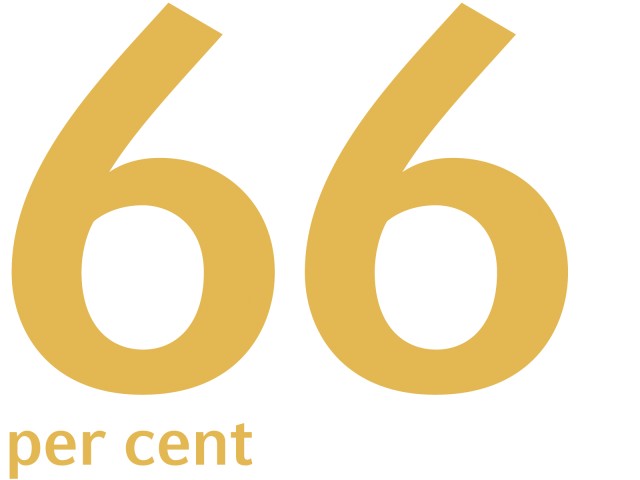
Vaillant Group
Code of Conduct for suppliers
In 2020, we developed a Supplier Code of Conduct that defines our guidelines on human rights, working conditions, health and safety, the environment, responsible and ethical business conduct and critical raw materials. The introduction of the Supplier Code of Conduct began in late 2020. By the end of 2021, around 490 suppliers, covering around 66 per cent of our purchase volume, had accepted our guidelines.
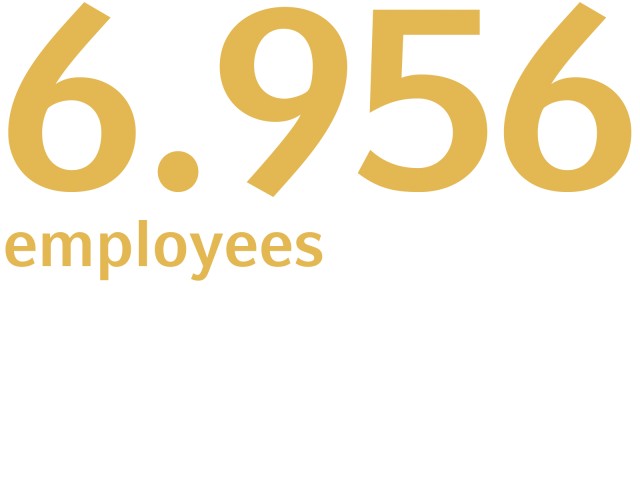
Vaillant Group
Anti-corruption training
Training our employees with regard to compliance is important to us. In 2021, almost 7,000 employees took part in training courses on the topic of “anti-corruption”. The training took place either online or in person.
The ten principles of the UN Global Compact
The United Nations has defined ten principles of socially and environmentally responsible action in its Global Compact. Upon signing up to the Global Compact, the Vaillant Group pledged its commitment to support the implementation of these principles. The focus areas of the SEEDS sustainability programme are related to the Ten Principles of the UN Global Compact. All ten principles are of equal importance to the company.
As part of this progress report, we provide excerpts relating to key measures and the progress made.
Human Rights
Principle 1: Businesses should support and respect the protection of internationally proclaimed human rights.
Principle 2: Businesses should make sure that they are not complicit in human rights abuses.
Labour standards
Principle 3: Businesses should uphold the freedom of association and effective recognition of the right to collective bargaining.
Principle 4: Businesses should uphold the elimination of all forms of forced and compulsory labour.
Principle 5: Businesses should uphold the effective abolition of child labour.
Principle 6: Businesses should uphold the elimination of discrimination in respect of employment and occupation.
Environmental protection
Principle 7: Businesses should support a precautionary approach to environmental challenges.
Principle 8: Businesses should undertake initiatives to promote greater environmental responsibility.
Principle 9: Businesses should encourage the development and diffusion of environmentally friendly technologies.
Fight against corruption
Principle 10: Businesses should work against corruption in all its forms, including extortion and bribery.
Measures and progress in the reporting period
Human rights and labour standards
GLOBAL COMPACT PRINCIPLES
1. Supporting human rights
2. Eliminating human rights abuses
3. Upholding the freedom of association and right to collective bargaining
4. Elimination of all forms of forced and compulsory labour
5. Abolition of child labour
6. Elimination of discrimination
Corporate principles, specifications and guidelines
Strategic sustainability programme SEEDS
Vaillant Group Code of Conduct
Vaillant Group human rights policy statement
Vaillant Group Spirit corporate values (courageentrepreneurship, trust, passion, integrity, passion))
UK Modern Slavery Act statement
Supplier management system (supplier screening, supplier assessment, general purchasing terms, contractual terms, Supplier Code of Conduct)
Measures and progress in the reporting period
Policy statement
The Vaillant Group commits itself to protect human rights. As a way of expressing our corporate responsibility, we drafted a declaration of principles to respect human rights, which was published in early 2020. The senior management team is responsible for the implementation of, and compliance with, the Vaillant Group human rights policy statement. All employees are obligated to incorporate the human rights policy statement within their day-to-day work and to observe it in their behaviour.
Risk analysis
Since 2020, we have been systematically analysing the impact of our actions on human rights and the environment in order to identify potential violations and those affected. On the basis of evaluation criteria, we analyse the probability of occurrence of violations, the severity of possible legal infringements, the reparability of potential damage and the possibility of counteracting or preventive influence from the Vaillant Group. With regard to our suppliers, we particularly assess our procurement countries with regard to possible risks. For this purpose, we use, among other things, the World Bank’s Worldwide Governance Indicators (WGI) and the CSR Risk Check . The risk analysis is repeated at least annually and its methodology is developed on an ongoing basis.
Risk management
iIn accordance with our Group Code of Conduct, the Vaillant Group companies respect human rights and international labour standards worldwide.
The Vaillant Group developed a holistic diversity and inclusion strategy in 2021 and has been implementing it since 2022. This has included measures to promote international exchange and cooperation, awareness-raising measures and learning activities with top management.
Salaries are benchmarked to ensure that they are in line with the market and fair. In Germany, over 80 per cent of employees at Vaillant GmbH are covered by collective agreements.
Works councils are recognised and supported. There are works councils at different levels, from the local works council to the central works council and Group works council to the European Works Council. This was founded in April 2001, which makes clear that the Vaillant Group has been committed to employee participation for as long as 20 years.
In 2020, we developed a Supplier Code of Conduct that defines our guidelines on human rights, working conditions, health and safety, the environment, responsible and ethical business conduct and critical raw materials. The roll-out of the Supplier Code of Conduct began in late 2020 and is being continuously expanded to other strategic suppliers. We place special focus on suppliers from high-risk countries. In addition, we oblige our suppliers to comply with the Global Compact criteria through our General Purchasing Terms.
We randomly check compliance with our sustainability requirements for suppliers in “social checks” as part of supplier audits. The standardised questionnaire used here is derived from the contents of the Supplier Code of Conduct in the areas of human rights and labour standards, occupational safety, environmental protection, anti-corruption and grievance mechanisms. New auditors are being introduced to the methodology of social checks on an ongoing basis. A total of 95 social checks were carried out in 2021. Due to the Covid-19 pandemic, some of the audits are taking place virtually. We ensure that our auditors are also trained in carrying out virtual social checks.
Grievance mechanism
We have put an electronic violation reporting system in place for employees, customers and business partners, which helps them to report violations of laws and internal regulations.
Reporting and further development
As well as the progress report for the UN Global Compact, the Vaillant Group also publishes a statement on the UK’s Modern Slavery Act once a year. The statement was published for the sixth time in 2022.
In the context of the regulatory requirements of the Supply Chain Act, we have set up a project to further develop our existing due diligence processes. In 2021, we first identified potential for improvement and, based on this, drew up an action plan that is to be implemented in the coming years. In addition to Sustainability Management, various other specialist departments such as Purchasing, HR and Compliance are involved in the project.
Environmental protection
Global compact principles
7. Taking a precautionary approach to environmental challenges
8. Promoting greater environmental responsibility
9. Developing and diffusing environmentally friendly technologies
Corporate principles, specifications and guidelines
Vaillant Group vision “Taking care of a better climate. Inside each home and the world around it.”
Strategic sustainability programme SEEDS
Multi-site certification pursuant to DIN EN ISO 14001
Vaillant Group environmental policy
Group-wide, binding environmental targets in the focus areas of Environment and Development & Solutions
Integrating environmentally relevant aspects into processes
Integration of sustainability criteria (6 Green Rules) in product development
Setting of a science-based target
Vaillant Group product strategy with a focus on renewable energies, high-efficiency technologies, system technology and digital services
Measures and progress in the reporting period
Climate targets
In 2022, the Vaillant Group set itself ambitious climate targets in accordance with the Science Based Targets initiative in order to substantially reduce CO2 emissions within its own area of business responsibility (Scopes 1 and 2) and in the value chain (Scope 3) and thus contribute to compliance with the global climate protection targets set out in the Paris Agreement.
Environmental management system
As part of the environmental management system certified according to DIN EN ISO 14001, we implement measures on an ongoing basis at our production and development sites to reduce energy and water consumption, as well as waste volume. We systematically analyse potential to increase energy efficiency at our sites. The focus is on the consumption of energy and in particular gas in the production processes and the buildings. The expansion of the regulations on mobile work has created opportunities to reduce office space and thus save energy. The office space at the headquarters in Remscheid, which is still in use, is mainly located in buildings with low energy requirements. Where possible, water is circulated and recyclable packaging is used for production materials. We conduct annual internal and external audits of our environmental management system. We also expect our suppliers to comply with applicable legal environmental standards and, where possible, to establish and further develop an environmental management system in accordance with DIN EN ISO 14001. In addition, since the end of 2020, we have required our largest suppliers to sign our Supplier Code of Conduct. This contains far-reaching specifications on the subject of environmental protection. We check whether our suppliers have an environmental management system as part of supplier audits.
Renewable energies
At all Vaillant Group locations, we check whether it is possible to generate our own electrical energy using photovoltaic systems. Since 2020, electricity that cannot be generated by the company itself has been obtained 100 per cent from renewable energy sources.
Vehicle fleet
We are planning measures to improve the eco-friendliness of our vehicle fleet (passenger cars and commercial vehicles). This includes, in particular, switching from vehicles with combustion engines to electrically powered vehicles. In the Vaillant Group national sales companies with the seven largest vehicle fleets, more than 100 electric vehicles were ordered in 2022. In addition, we are further expanding the charging infrastructure at our company locations.
Offsetting greenhouse gas emissions
Since 2020, we have been offsetting all remaining greenhouse gas emissions that arise within our own area of business responsibility (Scopes 1 and 2) despite intensive CO2 reduction measures with high-quality CO2 certificates from a Gold Standard-certified land use and afforestation project in Panama. In addition, we launched our own afforestation project in northern Costa Rica together with Munich Re in 2022. The newly emerging forest was planted on an area of over 1,000 hectares that was formerly used as pasture. The restoration of the near-natural rainforest promotes the biodiversity of wildlife and improves the water quality in the region. The project offers local people long-term social prospects through newly created jobs. The afforestation activities are certified according to the internationally recognised Gold Standard. At our headquarters, in cooperation with the Waldgenossenschaft Remscheid, we are exclusively committed to an approximately 13-hectare forest in the Bergisches Land region, which has been damaged by environmental influences. In March 2022, Vaillant Group employees actively supported a planting campaign in which almost 1,000 new trees were planted.
Reporting
All sustainability indicators are continuously recorded across the company and pooled together in a central reporting tool, the Vaillant Group Sustainability Scorecard. In 2022, sustainability software that will support the analysis, management and reporting of key sustainability indicators in the future was introduced.
Networks
We maintain an internal global network of sustainability representatives (SEEDS Ambassadors) who record and assess sustainability aspects in the relevant core areas every year. After a break caused by the Covid-19 pandemic, it was possible to hold a joint meeting of the SEEDS Ambassadors from the national sales companies and the central divisions at the headquarters of the Vaillant Group in Remscheid again in 2022, in which the current developments of various sustainability topics were presented and discussed. We champion the responsible use of natural resources in various initiatives and networks. Among others, we are a member of the Development and Climate Alliance, B.A.U.M. e.V. and the Sustainability Leadership Forum of B.A.U.M. e.V. / Nordakademie.
Training and awareness
New Vaillant Group employees in Germany take part in an introductory event on the company’s sustainability management as part of their induction. Since 2021, this training has also been open to all other employees and can be booked by anyone interested via an online system. Environmental training including job-specific content is regularly carried out in production. Sustainability is a focal point of the Vaillant Group’s international graduate programme “SustainabiliTeam”. We offer technology training courses for installers.
Technologies and products
The Vaillant Group develops energy-efficient and environmentally friendly products for heating, cooling and hot-water supply. They are the key to a successful energy transition in the buildings sector. The focus of the Vaillant Group is on heat pump systems that can cover up to 75 per cent of energy demand with freely available environmental heat. In particular, the aroTHERM plus heat pump, which uses a natural coolant, has enjoyed consistently high demand since its market launch two years ago. Thanks to its low global warming potential, this coolant is exceptionally environmentally friendly and enables high flow temperatures. As a result, these heat pumps can provide convenient heating and hot water not only in new buildings, but also in older existing buildings.
In order to allow sustainability criteria to be systematically observed from the very start of product development, we compiled the “6 Green Rules” in 2017, which are now firmly anchored in our product development processes. All product development projects must demonstrate compliance with these sustainability criteria. In the reporting period, we continuously held training sessions on the use of the sustainability criteria in product development – “6 Green Rules” – and supported the implementation of product development projects.
Commitment
We are a strategic partner of “SOS Children’s Villages worldwide” and support the international children’s charity with environmentally friendly and energy-efficient heating technology. This partnership has long been a key part of our company’s social engagement. In 2021, 21 SOS Children’s Villages were fitted with modern heating technology. In addition, the Vaillant Group supported SOS Children’s Villages with 11 social activities worldwide.
Fight against corruption
Global compact principles
10. Measures to fight corruption
Corporate princicples, specifications and guidelines
Vaillant Group Corporate Governance Policy
Vaillant Group Code of Conduct
Vaillant Group Compliance Management System
Vaillant Group Anti-Corruption Policy
Vaillant Group Spirit corporate values: entrepreneurship, trust, integrity, passion
Vaillant Group Supplier Code of Conduct
Measures and progress in the reporting period
The Vaillant Group conducts Group-wide compliance training courses on the subject of anti-corruption.
Group-wide, internal approval is required for gifts and benefits above a certain threshold that are to be granted to individuals.
Adherence to the Group Anti-Corruption Policy is reviewed and monitored by the Internal Audit department and the Group Compliance Committee.
The company has put an electronic violation reporting system in place for employees, customers and business partners, which helps them to report violations of laws and internal regulations.
Communicating the corporate values forms a firm part of welcome and induction events for new employees.
We expect our larger suppliers to sign our Supplier Code of Conduct. It also contains provisions for the fight against corruption as well as for responsible and ethical business practices.
In order to protect and promote mutual corporate targets, the Vaillant Group launched a Group-wide compliance management system as early as 1 July 2019. The system launch was accompanied by an internal information and communication campaign to raise awareness among employees. The Compliance Management System is aimed at all Vaillant Group employees and companies and is binding for them.
A key part of the Compliance Management System is the comprehensive Code of Conduct. This is based in particular on onetwo of the Vaillant Group’s fundamental corporate values: trust and integrity. The Code of Conduct helps to make sure that everyone acts in accordance with the rules, in keeping with all applicable laws and company regulations.
In addition to a Code of Conduct, Group guidelines have been published on all areas relevant to compliance. These include “anti-corruption”, “antitrust law”, “data protection” and “anti-money laundering”. These internal guidelines serve to protect both our employees and our company from experiencing any criminal repercussions or other disadvantages.
All employees have access to instructions, detailed information and e-learning programmes on the subject of compliance on the Vaillant Group intranet. Through a combination of Group guidelines, e-learning opportunities and in-person training, employees are provided with the required knowledge about regulatory content and the relevant contact partners in the company. This allows employees to better assess situations in everyday work and, if necessary, to seek advice from the responsible Compliance Officer.
Our Compliance Management System (CMS) has also been certified by an independent auditing firm for our main companies in Germany, France, Spain, the United Kingdom and Turkey in the areas of anti-corruption and antitrust law. The basis for this certification is the leading compliance standard IDW PS 980.

